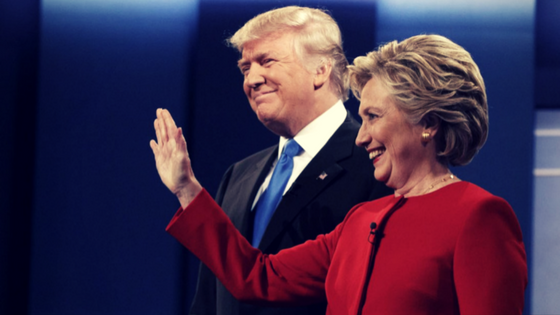
Unfortunately, neither Hillary Clinton nor Donald Trump will be completing our thorough psychometric assessments, so they need to rely on making the right impression through media exposure to the American voters. There are paradoxical forces at play whenever we receive information about either candidate that affect how we perceive them, and these perceptions eventually influence how we vote.
Throughout campaign season, we are continuously building and forming opinions about the characters of Trump and Clinton based on what we read, see on TV and of course our discussions with others. By the time the presidential debates roll around we already have set expectations for how they will perform. Even further, when we watch the debates we make judgments of the candidates against those prior expectations instead of their ‘then and there’ performances.
For example, if our expectations for Clinton prior to the debate were fairly low, it would be a surprise for us if she came across as confident, self-assured and genuine on TV. However, if she performed far better than we expected, our judgments of her would have changed entirely. This is because, psychologically speaking, when our attitudes change they usually move from one extreme to the other. If we start off thinking that Trump is confident and articulate, but then he shows himself to be confused and befuddled then we would likely change to the very opposite opinion rather than move to a slightly less positive view of him.
For each candidate’s campaign team, the psychological tendency of each voter to float to extremes when making up their minds poses a great challenge to their strategy.
“A trait of a genuine leader is to give and take advice; but ultimately they must be their own person and in the end have the confidence to make their own decisions.”
Throughout the course of their gruelling campaigns, each candidate must address innumerable target audiences – people of different ethnicities, genders, age groups, educational statuses, socioeconomic statuses, military statuses, employment statuses, not to mention their personal beliefs regarding political issues such as gun control and abortion. This presidential election may be frustrating because of the overwhelming amount of paradox heard both by what people expect of the candidates and by what the candidates say and do.
Google defines paradox as “a situation, person, or thing that combines contradictory features or qualities.”
Some nearly impossible paradoxical challenges that these candidates face are:
-
Build on people’s individuality yet talk to the sub-groups and the people as a whole
-
Stimulate people intellectually yet don’t go over the heads
-
Inspire people with a vision of the future yet focus on the here and now
-
Show empathy for everyone who is having a difficult time yet show analysis and decisiveness
-
Be strategic yet show you deal with the detail
So far in the election we can see a difference between how each of the two candidates portray themselves as leaders. Herminia Ibarra suggests there are two types of authentic leaders: low self-monitors and high self-monitors. Low self-monitors tend to say whatever comes to mind, whereas high self-monitors watch carefully what they say for its impact on others. The low self-monitors give us the feeling we know the person while the high self-monitors can appear reserved and block our understanding of their values and beliefs. Can you guess which type refers to which candidate?
Despite the complexity and paradox that burdens the US Presidential Election, there are fundamental questions we must ask of our potential future leaders, and we must be clear about how well we understand their answers. These questions are addressed in Authentic Leadership: Development and Validation of a Theory-Based Measure.
-
What do they believe is important?
-
What are their values?
-
Do they have integrity?
-
Do they have appropriate knowledge, skills and experience
-
Are they compassionate?
-
Are they professional?
“We need leaders who lead with purpose, values and integrity.”
The truth is there is no way around the paradox. As educated voters and consumers of media, the greatest thing we can do is simply be aware that there are infinite factors influencing the way the candidates speak and behave, and the way we hear, interpret and form opinions about them.


